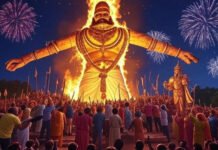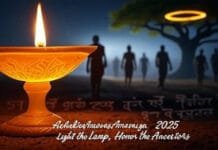INVC NEWS
Puri : Explore the intriguing connection between the moon and Lord Ganesha’s festival. Learn why looking at the moon on Ganesh Chaturthi is a practice deeply rooted in mythology .
The Mystery Behind Avoiding the Moon on Ganesh Chaturthi
Ganesh Chaturthi, a prominent Hindu festival celebrating the birth of Lord Ganesha, is a time of immense joy and fervor for devotees. It is observed with elaborate rituals, colorful processions, and heartfelt prayers. However, one peculiar belief associated with this auspicious occasion has puzzled many – the tradition of avoiding the sight of the moon on Ganesh Chaturthi night. In this article, we delve into the intriguing reasons behind this custom, uncovering the ancient legends and profound symbolism that make it an integral part of the celebration.
The Moon’s Mockery: An Ancient Legend
The legend goes back to the time when Lord Ganesha was returning home on his faithful vehicle, a mouse or rat, on a moonlit night during the Chaturthi of the Bhadrapada month. The moon god, Chandra, renowned for his captivating beauty, could not resist the temptation to ridicule Lord Ganesha’s unique appearance – his rotund belly, elephant head, and his humble mouse companion. This act of mockery deeply offended Lord Ganesha, who, in his wrath, cursed the moon god, decreeing that his light would never illuminate the Earth again.
In the wake of this divine curse, Lord Ganesha proclaimed that anyone who laid eyes on the moon during Bhadrapada Chaturthi would face unfounded accusations and slander, even if they were innocent. This ominous pronouncement cast a shadow of suspicion on anyone who dared to defy it, tarnishing their reputation and honor. Fearing for his existence, the humbled Moon Lord sought forgiveness, and in doing so, shed his haughty and insolent demeanor.
Though Chandra and the other deities implored Lord Ganesha for complete absolution, the curse could not be entirely revoked. Lord Ganesha decreed that people could gaze at the moon on any day except Bhadrapada Chaturthi. Should anyone defy this prohibition, they would inevitably encounter the malevolent effects of Mithya Dosha – the curse of false accusation.
Shri Krishna’s Encounter with Mithya Dosha
The impact of Mithya Dosha is not limited to Lord Ganesha’s legend alone. Even the illustrious Lord Krishna fell victim to its ominous influence after inadvertently glimpsing the moon on Chaturthi day. His transgression led to accusations of stealing the precious gem Syamantaka, a crime he did not commit. Sage Narada, who was privy to the details of Lord Ganesha’s curse, advised Lord Krishna to observe a fast as a means to counteract the impending misfortune.
A Mantra for Redemption
To mitigate the effects of Mithya Dosha, a specific mantra can be chanted:
Lion: Prasenamvadhitsingho Jambavata Hatah.
Sukumarak Marodistav Hyesh Syamantaka: ॥
This mantra serves as a protective incantation, aiding in the removal of false accusations and ensuring that the blessings of Lord Ganesha prevail. It acts as a reminder of the significance of avoiding the moon’s gaze on Ganesh Chaturthi and the perils that may befall those who ignore this ancient tradition.
In conclusion, the belief in refraining from viewing the moon on Ganesh Chaturthi is deeply rooted in rich mythological tales and symbolism. It serves as a reminder of Lord Ganesha’s divine wrath and the consequences of mocking his unique form. This age-old custom underscores the importance of respecting traditions and rituals, as they are an integral part of Hindu culture and spirituality.















